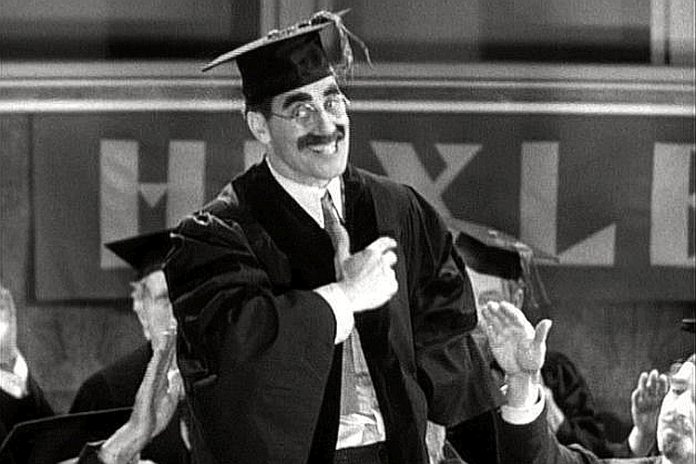In one of the most riotous comedies of all time and a world-class spoof of American college life, Professor Quincy Adams Wagstaff addressed the faculty and students of Huxley College in song in “Horse Feathers” (1932). Played by Groucho Marx, Wagstaff tells the assembled:
I don’t know what they have to say
It makes no difference anyway
Whatever it is, I’m against it!
No matter what it is
Or who commenced it
I’m against it!
Fast forward 87 years later and the same concepts apply to the anti-Olympic activists who turn up now and again in news reports after holding a lightly-attended press conference or demonstration.The latest chapter was headlined in a story entitled “We’ll all be losers in 2020, anti-Olympic activists say” in the Japan Times on 23 July which started with “Activists opposed to the Tokyo 2020 Olympic and Paralympic Games say the events will hurt individuals and businesses through high costs and disruption, and will provide only fleeting gains for a small number of people in the political, economic and media elite.”
That an anti-Olympic event in Japan was held at the Foreign Correspondents Club and featured an American academic demonstrated the weakness of the anti-Games movement in Japan. Moreover, the anti-Games efforts have been sidelined by a tsunami of support for the 2020 Games which has reached a level of popularity which was unforeseen even by its boosters during the bid process. Consider:
● The domestic sponsorship and suppliership program with the Tokyo Olympic Organizing Committee has reached record heights. The chair of the International Olympic Committee’s Coordination Commission said in late June that 62 companies had signed up as Gold Partners (15), Official Partners (32) and Official Supporters (15) contributing more than $3.1 billion, nearly three times what London 2012 ($1.1 billion) was able to bring in.
That’s the business response.
● The people of Japan have signaled their support of the Games twice over, in record numbers of volunteer applications and ticket requests … neither of which were expected in such volume.
The Tokyo organizers launched a volunteer recruitment campaign last fall, hoping to have about 80,000 applications to assist with the Olympic and Paralympic Games. Between 25 September and 21 December, a startling total of 186,101 applications were received, with 63% (~117,243) from Japan itself and the remainder from other countries (which says a lot about the power of the Games elsewhere).
That does not count the 36,649 applicants who signed up to volunteer – against a hoped-for total of 20,000 – the Tokyo Metropolitan Government during the Games period.
● The response to the ticketing program was just as amazing, with 7.5 million applicants in Japan itself registering for the first round of the ticket lottery. That’s against a total tickets-available target of 7.8 million for the Games, priced from about $22 U.S. up to more than $1,183 for the most expensive tickets for the ceremonies.
There were so many people who didn’t get the tickets they wanted that a second round of lottery sales for those folks will be held against on 22 August.
This is a level of actual, individual support for the Games which is remarkable on every level.
This is not to say that Tokyo has not had its problems, notably with the cost of the Games, which exploded – especially on the governmental side – with the building of a new national stadium, a new aquatics center and an Olympic Village. There have been governmental reports that link projects with barely any relationship to the Games to the costs, but the current projections are that the 2020 events will actually cost about $12.6 billion U.S. Of that, $5.6 billion will be paid by the self-funding organizing committee.
The remainder, or $7 billion, will be paid by the Tokyo Metropolitan Government ($5.6) and the Japanese national government ($1.4). The TMG aspect of the budget has been heavily criticized – and rightly so – but as a total expenditure over the seven years of the preparation period, it’s worth noting that the annual TMG budget (as of 2016) was 7 trillion yen or about $65.8 billion.
The anti-Tokyo Games group claimed the event will “‘violate human rights’ through disruptions to public transportation and the displacement of homeless people.” That there is going to be traffic in Tokyo is hardly news and what happens to the homeless during the Games period is hardly as important as what happens to them long-term.
But this demonstrates a long-standing truth: protests against the Olympic Games usually have very little to do with the event and are almost always a stalking horse for dissent against one or more levels of government in the city or country where the Games take place. Activists who have lost at the ballot box use these events to try and gain some measure of notice by attacking their real target – government – in another way.
Tokyo’s Olympic success is far from assured, however. Staging an Olympic Games is an enormous effort that will stretch even a megalopolis like Tokyo to its limit. The current heat wave in Japan will be the cause celebre – at least for now – through to the Games next summer.
There will be problems and the organizing committee, governments, businesses and the client participants – such as the International Olympic Committee, the International Federations and the National Olympic Committees will all have to be part of the solutions.
But the stunning turnout of support for the Games in Japan, from business and individuals, show that the voices of the anti-Games crowd have been recognized for what they are: an unfunny, 21st Century version of Groucho as Prof. Wagstaff, head of the fictional Huxley College. As he put it:
Your proposition may be good
But let’s have one thing understood
Whatever it is, I’m against it!
And even when you’ve changed it
Or condensed it
I’m against it!
Personally, I preferred “Animal Crackers” or “Duck Soup“, but that’s ir-elephant to what this column was about.
Rich Perelman
Editor



























